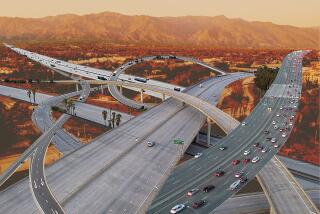You can’t ignore all that road noise: It could shorten your life

- Share via
Living in a city like Los Angeles means being exposed to honking horns, revving engines and loud traffic on a pretty much constant basis. You know this; what you might not know is that living in the vicinity of road noise, or spending too much time on the noisy freeway, might be endangering your health. New international research is shedding light on the unique problems that this kind of noise pollution can present:
•Researchers at the London School of Hygiene & Tropical Medicine in partnership with Imperial College London and King’s College London found that long-term exposure to moderately loud or very loud traffic sounds during the daytime — the kind you’d experience after months to years of city dwelling — contributed to the risk of a shorter life expectancy. “In this study, we observed that the risk of death from any cause was increased by 4% in areas with noise level over 60 decibels when compared to quieter areas,” said study co-author Jaana Halonen. “Risk of death from ischemic heart disease was also increased by 3% in adults and 4% in the elderly in areas with daytime noise levels of 55-60 decibels, when compared to areas with noise levels under 55 decibels.”
The researchers believe this happens because traffic noise can cause spikes in blood pressure and increased levels of stress hormones such as cortisol and noradrenaline, which can increase stress and sleep problems.
And all of these factors can raise your risk of cardiovascular conditions.
•A new study by Swedish researchers, published in the journal Occupational & Environmental Medicine, found that being immersed on a daily basis in road noise — as well as noise from a nearby airport or rail station — can widen your waistline. Sixty-two percent of subjects regularly exposed to 45 decibels or higher of road, airport or rail noise had a 25% to 50% larger waist measurement than those not exposed to this noise. The researchers also found that road, airport and rail noises increase the body’s production of the stress hormone cortisol, which affects metabolism.
•Ongoing research by Danish scientist Mette Sorensen indicates that people 65 or older who live in high road noise areas were 27% more likely to suffer a stroke; what’s more, Sorensen believes her results could indicate that up to 19% of all stroke cases could be due in whole or part to traffic noise. The damage is cumulative — the longer you live near the noise, the higher your stroke risk. Interestingly too, Sorensen found the main factor contributing to these strokes is Type 2 diabetes. Her findings indicate this is because road noise lowers one’s ability to get quality sleep, which causes decreased glucose tolerance.
So is it time to move?
Keep the research in perspective, experts say. Individual responses to road noise is not universal.
“For some people, daily exposure to road noise may not be so stressful — these people can habituate to that stress effect much better than others,” says Dr. Emeran Mayer, professor and director of the Oppenheimer Family Center for Neurobiology of Stress at UCLA. “Their brains may be more resilient in that way. Other people, especially those whose genetic makeup may predispose them to obesity, for example, may experience health problems due to road noise stress.”
If road noise has your nerves on edge, and especially if you have risk factors for obesity, heart disease, stroke or diabetes, you can take action to reduce the impact.
Four ways to reduce the effects of road noise:
Muffle the sound at home. Consider whether freeway noise might be seeping into your house in unexpected ways. “Houses and apartments also have exhaust vents, attic vents, unsealed construction joints, electrical outlets and other openings which are ‘weak links’ for the transmission of noise,” says David Lord, a principal at 45dB Acoustics Consulting, who works throughout the greater L.A. area. “As soon as you seal one avenue for noise transmission, the remaining openings become more obvious, so they all have to be dealt with for the best solution.” (One tip: Lord recommends laminated glass as an exterior noise barrier for windows, as it can reduce noise levels by as much as 10 decibels.)
Breathe. “Abdominal breathing — breathing with the diaphragm, in the abdomen instead of breathing in the chest — signals to the brain to go into a relaxed state,” says UCLA’s Dr. Emeran Mayer. You can practice this kind of breathing any time you’re stuck in traffic.
Distract your ears. Lord is a fan of white noise. “There’s an iPhone app for $2 — and I can switch to pink noise, blue noise, or a mountain stream or rainstorm or surf ... the variations are endless,” he says. Also, listen to any kind of music you love during a noisy commute. Research shows it reduces stress responses.
Live healthfully. Eating a healthful diet rich in fruits and vegetables can help lower the risk of heart problems, strokes and diabetes. Also, exercise 30 minutes a day, five times a week, for the same preventive reason.
ALSO:
Why CrossFit’s founder wants the government to put warning labels on sugary drinks
Medical professionals disagree about new hangover remedies
Why do we like scary movies? It’s an escape and adrenaline rush, expert says






